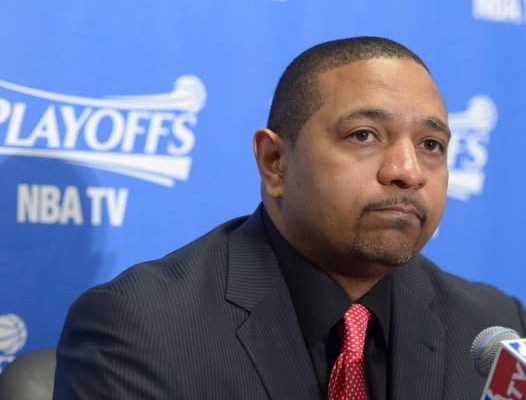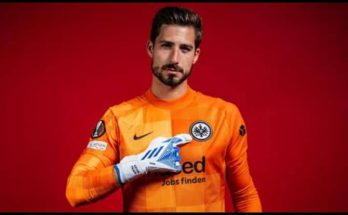BREAKING NEWS: Former Golden State Warriors head coach Mark Jackson, who has steadily built a presence in the media space since his departure from the sidelines, has sent a surprising and poignant message directed at current Warriors coach Steve Kerr. The message, though not delivered through traditional press conferences or NBA media scrums, arrived subtly but powerfully through Jackson’s newly launched podcast — a platform that has quickly gained traction in both basketball and pop culture circles. The moment came unexpectedly in the midst of a wider conversation about leadership, accountability, and the state of the modern NBA. Listeners were drawn in as Jackson, with his trademark charisma and deep baritone voice, pivoted from discussing his faith and experiences as an ESPN analyst to offering what many are calling a pointed but deeply reflective commentary on his coaching tenure with the Warriors — and where the franchise has gone since.
Jackson, who coached the Warriors from 2011 to 2014 and played a foundational role in transforming the team from a perennial lottery squad into a playoff contender, did not mince words. Without naming Kerr directly, he hinted at unfinished business and unresolved narratives from his tenure, all while expressing an earnest hope that the team he once led could find a path forward amid turbulence. “I know what we built,” Jackson said. “I know what those locker room moments meant, I know what we sacrificed, what we endured. Some people inherited a palace that we built from rubble. And you know what? God bless ’em. But don’t forget the masons who laid the bricks.” The comment struck a chord with both fans and analysts alike, reigniting a long-standing debate over how much credit Jackson deserves for the Warriors’ subsequent dynasty years under Kerr.
Although Jackson never mentioned Kerr’s name, few doubted who the message was directed at. His tenure with the Warriors ended amid controversy and reported friction with ownership and members of the front office. Still, many of the players Jackson coached — including stars like Stephen Curry and Klay Thompson — have publicly acknowledged his influence on their development and the team’s early success. Jackson was the coach who first empowered Curry and Thompson to shoot without hesitation, built a defense-first identity that hadn’t existed before, and famously predicted that the two guards would one day become “the best shooting backcourt in NBA history.” That proclamation, once viewed as hyperbole, became the foundation for a basketball revolution.
Yet, when Jackson was fired in 2014 and replaced by Kerr, the Warriors immediately won a title the following season. That swift success under Kerr helped frame a narrative that Jackson had perhaps taken the team as far as he could, and that a new voice was needed to push the roster to elite heights. Kerr’s more collaborative coaching style, his willingness to experiment with lineup versatility and pace, and his harmony with the front office became hallmarks of a new era. But for Jackson, the sudden and brutal end to his coaching career has never truly healed. Though he’s remained graceful in public, refusing to engage in direct mudslinging, his latest comments suggest a man still carrying the weight of missed opportunity and unrecognized labor.
In the podcast, Jackson also recounted a private moment he once shared with a young Draymond Green, whom he described as “a sponge for knowledge, full of passion, and destined for greatness.” Jackson noted how Green, who was drafted during Jackson’s tenure, wasn’t immediately recognized as a cornerstone piece but had a hunger that couldn’t be coached. “We saw it then,” Jackson said. “He had the fire. It’s not about X’s and O’s sometimes. It’s about belief. And I believed in those guys when most people didn’t.” That kind of emotional recollection added fuel to the perception that Jackson feels disconnected from a legacy he helped shape but never got to fully claim.
What made the message particularly compelling was its tone — not bitter, not accusatory, but undeniably firm. Jackson framed his remarks within the broader context of leadership and purpose, suggesting that coaching is as much about building character as it is about winning games. “When you’re called to lead, it’s not always about being liked,” he said. “It’s about setting a culture, making people uncomfortable for the sake of their growth, and doing what you know is right even when it costs you. That’s what I did, and I’ll never apologize for that.” The podcast quickly trended across social media platforms, with thousands of fans, journalists, and former players weighing in. Some lauded Jackson for finally speaking his truth, while others criticized him for reigniting old wounds.
Steve Kerr, for his part, has not issued a response to Jackson’s remarks. Known for his measured and diplomatic public persona, it is unlikely Kerr will engage in a back-and-forth, especially with the team currently in the midst of evaluating a major offseason reshuffle. The Warriors are at a crossroads. With Klay Thompson now a member of the Dallas Mavericks, Draymond Green coming off a tumultuous season marked by suspensions and controversy, and the window of contention rapidly shrinking, questions abound about whether Kerr can rejuvenate the roster and rekindle the fire that once made Golden State a dynasty. Against that backdrop, Jackson’s message lands like a reminder: before the rings, before the records, before the global spotlight, there was grit, belief, and sacrifice — and he was a part of that story.
Among fans, the divide is generational and emotional. Many younger Warriors fans who grew up watching the 2015-2019 run associate Kerr with greatness and view Jackson as a prelude. But older fans remember the wilderness years — the Monta Ellis trade, the futility of the Don Nelson years, the occasional flash of hope under Baron Davis. For them, Jackson’s run symbolized the beginning of hope. He took a broken franchise and gave it structure, gave it belief, and gave it a blueprint. That blueprint was built on defense, accountability, and a deep belief in the potential of a core group. While Kerr elevated that core with his offensive genius and masterful people management, it’s clear that Jackson still feels some level of unacknowledged ownership over the foundation that made that elevation possible.
Jackson’s podcast also delved into themes of redemption and spiritual resilience, suggesting that his own coaching story isn’t finished. Though he hasn’t had another head coaching opportunity since his Warriors stint, he emphasized that he remains ready for the right situation. “I know there are narratives out there,” he said, alluding to reports of personality clashes and ideological rigidity during his tenure. “But I also know who I am. And the game knows. That’s why I stay ready.” In the wake of his comments, rumors began swirling about potential coaching vacancies next season — from rebuilding teams to struggling franchises looking for a cultural reset.
At the heart of all this is a complicated but human story. Mark Jackson, a former NBA point guard and longtime broadcaster, poured himself into coaching a team that he believed in when few others did. He watched as that team soared to historical greatness under someone else’s leadership. He’s been vilified in some circles and lionized in others. But now, with a platform of his own, he’s speaking on his terms. Whether his message was meant as a challenge, a reflection, or a subtle invitation to rewrite the past, it resonated in a way that few expected.
The Golden State Warriors, meanwhile, are navigating their own identity crisis. With Steph Curry still performing at an elite level but time working against them, the pressure is mounting. Can Kerr retool the roster and strategy to contend again? Will younger players like Jonathan Kuminga or Moses Moody step into larger roles? What does the post-Klay future look like for the team? And underneath all of that, does Jackson’s shadow — or his unspoken desire for reconciliation or recognition — still linger in the corridors of Chase Center?
It’s a fascinating twist in a larger basketball narrative that continues to unfold. For now, Jackson’s podcast episode stands as a bold moment of transparency and self-affirmation. Whether it leads to a greater reckoning within the Warriors’ organization, or perhaps a new chapter in Jackson’s coaching journey, remains to be seen. But one thing is certain: the conversation around his impact — and his message to Steve Kerr — is far from over.



